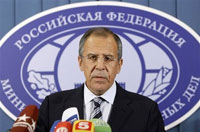Russia harshly criticizes Group of Seven members for their hypocrisy
G7 countries united against Russia and issued a joint statement in which they condemned Russia’s recognition of South Ossetia and Abkhazia.

Foreign ministers of Canada, France, Germany, Italy, Japan, the USA and Great Britain said that Russia had violated the territorial integrity in Georgia, as well as the resolution of the UN Security Council regulating relations between Georgia, Abkhazia and South Ossetia.
"Russia's decision has called into question its commitment to peace and security in the Caucasus," the counties' foreign ministers said in a statement. "We deplore Russia 's excessive use of military force in Georgia and its continued occupation of parts of Georgia."
The ministers urged Russia to withdraw its troops from Georgia to the positions where they had been stationed before the conflict.
When Russia’s Dmitry Medvedev signed the decree to recognize the independence of the two republics on August 26, Ukraine was one of the first countries that showed its reaction to the decision. The Ukrainian administration declared its support for the territorial integrity of Georgia. The reaction from Washington, Paris and London followed soon afterwards. Britain’s Foreign Secretary David Miliband stated that Western countries were working on a coalition against the Russian aggression in Georgia . For the time being, Russia has only one supporter of its actions in the Caucasus – Hamas movement, which many countries consider a terrorist organization.
In the meantime, Georgia started the previously promised procedure to cut its diplomatic ties with Russia. The Georgian Embassy in Moscow will reduce the number of its diplomats to only two officials. Russia will not be doing the same, a spokesperson for the Foreign Affairs Ministry of Russia said.
France, a co-chairing state at the European Union, has blocked the initiative of Poland and the Baltic states to invite Georgian President Mikhail Saakashvili for the emergency EU summit which is slated to open September 1 in Brussels.
“Saakashvili will not be present at the summit,” an official representing the Council of Europe said.
The Georgian president stated in his recent interview with Germany’s Bild that he would not be attending the summit due to his fears to leave the country.
“The Russians will block our airspace and will not let me return to the country,” he said.
Russian President Dmitry Medvedev said in a telephone conversation with French President Sarkozy that Georgia must withdraw its troops to the locations of their permanent deployment.
Medvedev described his point of view in detail in connection with Sarkozy’s concerns about the current situation in the region.
Medvedev was also on the phone with German Chancellor Angela Merkel, although it is not known whether the Russian president managed to talk Merkel round to his way of thinking.
Russia’s Foreign Minister Sergei Lavrov said that the criticism of Western states pertaining to Moscow’s initiatives in solving the conflicts between Georgia , South Ossetia and Abkhazia, caused a lot of raised eyebrows in Russia.
Lavrov harshly criticized his British counterpart, David Miliband, who said that Russia was still following the temptations of power politics.
"The sight of Russian tanks in a neighbouring country on the 40th anniversary of the crushing of the Prague Spring has shown that the temptations of power politics remain. The old sores and divisions fester. And Russia is not yet reconciled to the new map of this region,” the British Foreign Secretary said.
“It is not the appearance of Russian tanks in a neighbouring country, but the attack of Tskhinvali by Georgian tanks, aviation and Grad volley fire systems that took place during the day when the Olympic Games opened. Saakashvili thereby broke the Olympic truce declared by the UN General Assembly, Lavrov said.
The Russian minister responded to a statement about Russia’s supposed attempts to remake the map of the region.
“This map inclusively constitutes of conflict zones, regulated by the agreements, which have Georgia’s signature on them and which Saakashvili treacherously terminated,” Lavrov stressed out.
The head of the Russian Foreign Ministry said that Miliband’s appeals to democracy in Russia were ridiculous.
“We know what Saakashvili’s regime is about, and how his Western patrons forgive him everything including provocations against peacemakers, the suppression of opposition, the banning of all Russian TV channels in Georgia,” the minister said.
Lavrov added that he disagreed with David Miliband, who described NATO as an anchor of stability, democracy and the economic development.
“I’ve never heard of NATO’s activities to spread democracy, but things have apparently changed,” Sergei Lavrov said.
“I will leave this without any comments, nor will I comment on his statement claiming that this is the price of the division of Europe. It is the unjustifiable and the unfounded expansion of NATO that leads to such a division,” the minister said.
Lavrov paid attention to several factual mistakes in Miliband’s statements, who said that Russia had blocked ports, tunnels and other objects of the Georgian infrastructure.
“Only God knows where he took that information from. Journalists, international representatives and civilians can prove the opposite. When they say that they do not want to find out who started the conflict first, we believe that hypocrisy and modesty do not suit here towards those who were attacked in the middle of the night, he said.
Subscribe to Pravda.Ru Telegram channel, Facebook, RSS!





